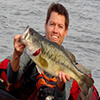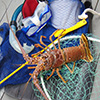Frequently asked questions
When do I need to get a freshwater fishing license?
In Colorado, a freshwater fishing license is mandatory for all fishermen. All bodies of water in Colorado are freshwater bodies of water; therefore, you will not see a distinction made between freshwater and saltwater fishing licenses. There are several different types of fishing licenses available for fishermen, starting with resident and non resident fishing licenses. Both can be chosen in one- to five-day licenses to fish, as well as annual fishing permits. Depending on if you are a senior, disabled or in the military, you are responsible for paying different licensing fees.
How long will my fishing license be valid?
Colorado fishing licenses are valid for different periods of time. For instance, resident and nonresident fishermen can choose between one- and five-day fishing licenses. An annual resident fishing license or nonresident fishing permit is also available. The one exception is for the totally and permanently disabled. With a physician’s note, Colorado fishermen that are handicapped are qualified to receive a lifetime fishing license. Others who are eligible for a lifetime fishing license are seniors (64 and older) who suffer from 60 percent disability. The cause of disability must be military related, and appropriate paperwork is needed.
How can I obtain a fishing license replacement?
Replacing fishing licenses in Colorado is made possible by visiting a Colorado Parks and Wildlife office. Other options are to find a nearby kiosk or even a third-party agency – such as Walmart – that is authorized to give out Colorado fishing licenses. The option to replace fishing licenses online is available through the Colorado Parks and Wildlife website. The most preferred option is to simply go in person, because then a damaged or lost fishing license replacement can be issued on the spot. Duplicate fishing license fees vary depending on the type of fishing license you have.
What documents do I need to present as proof of Colorado residency?
In order to prove residency of Colorado to get a fishing license, you must show proof that you have lived in the state for a minimum of six months. A CO driver’s license or ID card is sufficient proof so long as the issue date indicates six months of time. In the event that your identification card was replaced or renewed within six months though, then you must bring three of the following mail types that were mailed more than six months ago:
- Bank statements
- CO voter’s registration card
- Phone bills
- Utilities bills
- Pay stubs
- Lease agreement
Can a disabled resident apply for a CO fishing license?
Yes, disabled Colorado residents may apply for a CO fishing license. In fact, the Colorado Parks and Wildlife foundation encourages disabled fishermen to apply by offering a lifetime fishing license to residents who are permanently disabled. In order to be granted a lifetime license to fish, a note made out on official letterhead by the fisherman’s physician must be submitted. This letter, in addition to a “Final Admission of Liability” from the Division of Worker’s Compensation and a CO ID card, will be needed.
What are Free Fishing Days?
The majority of US states offer several days of free fishing to local fishermen. Often, it is a way of announcing that fishing season is back on. In Colorado, free fishing days are always the first full weekend in June. The rest of the year though, all residents and visitors alike must abide by the standard CO fishing license rules and regulations. If you are caught fishing – in either state or private waters – without a valid fishing license, a ranger will issue you a ticket.
Are there any visitors who do not require a Colorado fishing license?
No, there are no visitors exempt from getting a Colorado fishing license. All fishermen who would like to fish on Colorado waters – both public and private – are responsible for getting a fishing license. Visitors do not have to get an annual fishing license though. Instead, they can opt for one- or five-day fishing permits. For individuals in the military and currently stationed in Colorado, you would actually be eligible for a resident fishing license. Note that if caught fishing without a non resident fishing license, you will be issued a ticket fine.
Do all people on a recreational fishing boat need to have a license?
No, in Colorado, only members of the boat party that are fishing need to get a fishing license. There are different types of fishing licenses available in Colorado. Residents living in Colorado for at least six months may get a resident fishing license, and for those that visit the state, a nonresident fishing license is available. If you plan on heading out on a boat several times throughout the year, getting an annual fishing license could be of interest to you. Remember that regardless of your age or residency, all individuals fishing in a boat must have a Colorado fishing license.
Is an ice fishing license needed in Colorado?
No, there is not a specific fishing license for ice fishing in Colorado. Instead, a regular fishing license is needed, whether it is a lifetime fishing license, a resident fishing license or a nonresident fishing license. Ice fishing is available in both public and private waters, so note in advance that if you are visiting a privately owned ice fishing site, there will be a small entrance fee. When participating in ice fishing, there are certain rules and regulations to abide by. For instance, the diameter of an ice-fishing hole can be no larger than 10 inches in diameter.
Who is eligible to receive a commercial fishing license in Colorado?
Depending on the state waters you intend to fish in, a Colorado commercial fishing license can be obtained in one of two ways. You can get a commercial license to fish at a CO Parks and Wildlife office or through the owner of a privately owned body of water. With a commercial fishing license, these landowners or entities are authorized by the state to charge fishermen to fish in their lakes. Fees vary from site to site and, oftentimes, a fishing guide is connected with a privately owned freshwater site to guarantee a special fishing experience.




